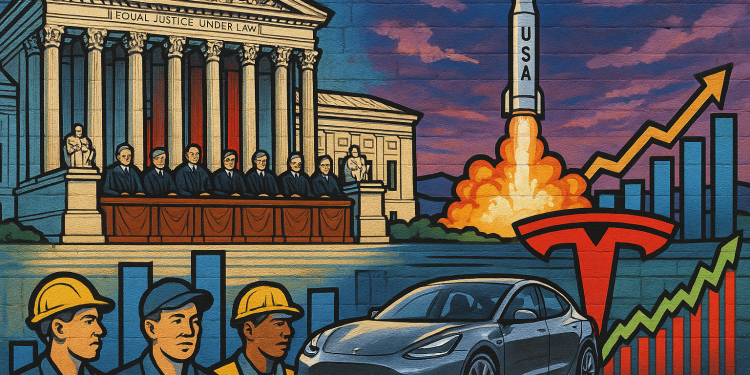The United States witnessed a series of high-impact developments on Wednesday across its political, defense, and economic fronts — from the Supreme Court scrutinizing President Donald Trump’s tariff powers, to a renewed nuclear missile test, shifting momentum in the electric vehicle market, and a modest rise in private-sector employment.
Here’s a look at the key highlights shaping the day’s news.
Supreme Court questions Trump’s tariff authority
The US Supreme Court appeared skeptical of President Donald Trump’s extensive global tariffs, as several justices suggested that the former president may have exceeded his legal authority in imposing the sweeping trade measures.
During a session lasting more than two and a half hours, three members of the court’s conservative majority, including Chief Justice John Roberts, Justice Neil Gorsuch, and Justice Amy Coney Barrett, expressed doubts about Trump’s reliance on the 1977 International Emergency Economic Powers Act (IEEPA) to justify tariffs ranging from 10% to 50% on most imports.
Roberts noted that imposing tariffs amounted to “taxes on Americans,” traditionally a congressional power.
Gorsuch questioned whether such authority could effectively allow Congress to surrender its responsibility over foreign commerce.
A ruling against Trump could force the government to refund more than $100 billion in tariffs and relieve US importers of a significant financial burden.
The decision, expected by year-end, could also mark the Supreme Court’s most significant check on Trump’s use of executive power during his presidency.
US conducts nuclear-capable missile test
The United States Air Force launched an unarmed Minuteman III intercontinental ballistic missile (ICBM) from Vandenberg Space Force Base in California as part of a pre-scheduled test.
According to the Air Force Global Strike Command, the missile successfully landed near the Ronald Reagan Ballistic Missile Defense Test Site in the Marshall Islands.
The test came shortly after President Trump urged the military to resume nuclear weapon testing for the first time in over three decades, underscoring rising geopolitical tensions and Washington’s efforts to maintain strategic deterrence.
Tesla shares edge higher ahead of shareholder vote
Tesla Inc. shares rose 3.8% to $461.34 on Wednesday morning as investors positioned themselves ahead of the company’s annual shareholder meeting scheduled for Thursday.
The meeting will center on CEO Elon Musk’s proposed $1 trillion compensation package, a plan tied to expanding his ownership and voting control at Tesla.
Major investors, including Norway’s sovereign wealth fund and proxy advisory firm ISS, have voiced opposition, citing governance and dilution concerns.
Despite the criticism, analysts expect shareholders to approve the package.
Wedbush Securities analyst Dan Ives said Musk’s leadership is “integral to Tesla’s success,” predicting strong support for the compensation plan and a proposal to allow Tesla to invest in Musk’s xAI venture.
Meanwhile, Chinese automaker BYD continues to outpace Tesla in key European markets like the UK and Germany, registering significantly higher sales and narrowing the year-to-date gap with its US rival.
Private sector employment Rises in October
According to ADP’s monthly employment report, US private employers added 42,000 jobs in October, surpassing market expectations.
Large companies with over 500 employees led hiring with 74,000 new jobs, while mid-sized firms shed 25,000 positions.
The trade, transportation, and utilities sector saw the biggest gains with 47,000 new jobs, while the information sector recorded 17,000 layoffs.
ADP Chief Economist Dr. Nela Richardson noted that while job growth resumed after several months of stagnation, overall hiring remains modest. “Pay growth has been largely flat for more than a year,” she said, indicating a balanced labor market between supply and demand.
The post US digest: Supreme Court questions Trump tariffs, Tesla faces key vote appeared first on Invezz







